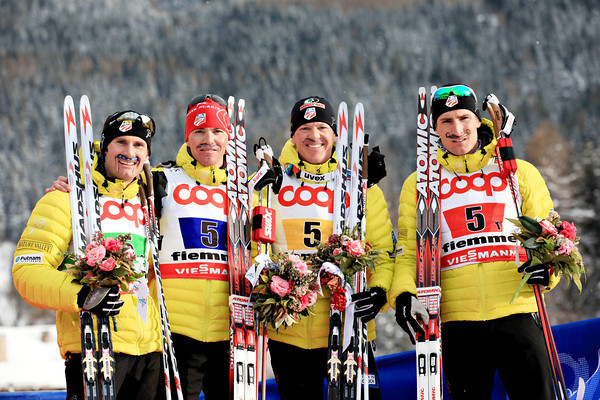Anchored by Billy Demong, the fan favorite from the Vancouver 2010 Olympics, the U.S. Nordic combined team raced Sunday to a history-making bronze in the relay at the 2013 world championships at Predazzo, Italy. The third-place finish made for the first-ever U.S. team world championships medal in Nordic combined. The best prior world championships result? Fourth, in 1995.
Of course, the U.S. men took silver in the relay at the 2010 Vancouver Olympics.
The bronze Sunday came as U.S. women -- Kikkan Randall and Jesse Diggins -- won gold in the team sprint at the 2013 worlds. That made for the first world championships gold medal the U.S. cross-country team has won, ever; the only Olympic medal the U.S. cross-country team has won dates to 1976, Bill Koch's silver in the 30-kilometer event.
For those who believe third is just two lonely places away from first, Sunday's bronze serves as an important reference beyond its place in history. It gives renewed legitimacy to prospects the U.S. Nordic team might -- might -- be able to recapture the magic of its breakout performance in Vancouver.
Candidly, and everyone in the United States associated with a sport like Nordic combined will acknowledge it, as satisfying as a bronze medal at the world championships is, and it is, what matters is the Olympic Games. That's when America pays attention.
That's why what happened in Vancouver was so big. Demong won individual gold (on the large hill), Johnny Spillane two silvers (the large and normal hill) and then there was the relay silver. For years and years, Demong, Spillane, Todd Lodwick and Brett Camerota had put in the work; U.S. Ski Team officials had launched a plan for medals in 1996, and never wavered. Vancouver brought the payoff.
The night he won gold, Demong proposed to his longtime girlfriend, Katie Koczynski. Then he was chosen to carry the U.S. flag in the closing ceremonies.
Heady stuff for a Nordic combined guy, for an athlete from an American program that before Vancouver had never, ever won an Olympic medal of any sort.
Now Billy and Katie are the parents of 2-year-old Liam.
Now Billy is 32; he'll be 33 next month. Lodwick, who skied Sunday's third leg, is 36; he will be 37 in November.
Now, too, the program has seen the emergence of the Fletcher brothers, Taylor and Bryan, who -- like Lodwick and Spillane -- are from Steamboat Springs, Colo. Demong -- originally from the area around Lake Placid, N.Y. -- now calls Park City, Utah, home.
Bryan, now 26, was named the FIS Nordic combined athlete of the week at the end of the 2012 season, after his victory at the World Cup finale at Holmenkollen in Oslo, Norway.
Taylor, 22, won the same award last month for his fifth- and third-place finishes -- his first career podium -- in Seefeld, Austria.
Taylor might well be the fastest skier on the circuit, testament to his own talent and U.S. coach Dave Jarrett's training program, which calls for repeated blocks of intensity workouts.
What has been the sticking point -- as the U.S. team builds toward Sochi -- is not the skiing.
It has been the jumping.
On Sunday, the Americans got a big break.
Taylor Fletcher got a wind-based re-start. Essentially, he got a do-over on his jump. His first jump? 79 meters. The second try? 93 meters. Big difference.
With that, the Americans started the skiing in fifth, about a minute behind the best-jumping Japanese. Taylor Fletcher skied first, Bryan next. Bryan moved to second early in his leg, then tagged to Lodwick in third, 23.3 seconds behind Austria.
Lodwick tagged to Demong with the U.S. a close fourth.
Early in his anchor leg, Demong surged to the lead, ahead of Japan, France, Norway and Austria. With under two kilometers to go, he still held the lead, followed by Norway's Magnus Moan and France's Jason Lamy Chappuis.
Those two attacked on the final climb. Demong fell back.
Lamy Chappuis broke to the finish, crossing four-tenths of a second ahead of Moan. Demong held off Japan's Yusuke Minato and Austria's Mario Stecher; Demong finished 4.2 seconds back of first.
"Honestly, going into the last leg I had a goal to just ski a smart race and not lead it all," Demong said. "I ended up leading almost the whole thing.
"In the end I was a little unsure if the other guys were really going to be fresh, and coming down the last hill, I’m like, 'Don’t look back, you don’t want to know. Just keep chasing Magnus and Jason.’ So I think it was really a relief to come within five meters of the finish line and just glance and say, 'OK, yeah, we’ve got this.' "
All four guys wore U.S. flag mustaches -- a team-bonding thing. They had agreed Saturday night they would do it, and the mustaches were the talk of the news conferences afterward.
Maybe it'll be a trend for Sochi 2014.
"We came in this knowing that we were going to be close for the cross country, knowing the jumping had put ourselves in position," Taylor Fletcher said.
"We don’t come to this competition to lose so we did our best to fight for the podium and fight for the victory. I give it up to our staff, teammates, coaches and, of course," he said, "the mustache was the deciding factor in this."

